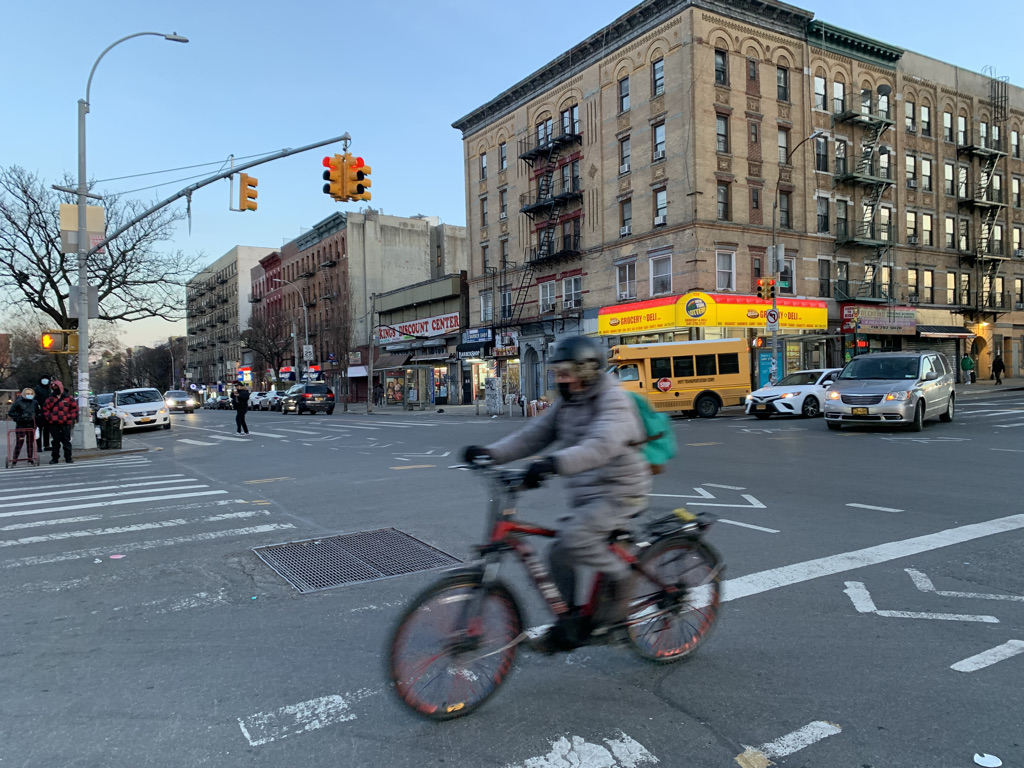Miguel, an immigrant from Mexico, has struggled ever since he began making food deliveries on his e-scooter around the South Bronx in 2014. Once, he was knocked off his bicycle when a taxi suddenly opened its door. He has lost three bicycles — totaling around $5,000 — to theft, he said. Meanwhile, his net earnings often average less than $15 per hour — the minimum wage for most sectors in the city, but not to delivery workers.
(Para leer una version de “Nuevas protecciones vigentes para los “deliveristas” en español, vaya a esta versión.)
New city laws that are phasing into effect in this year are designed to help delivery workers like Miguel. The laws create more transparency around tipping, improve workers’ access to bathrooms, give them more control over deliveries, and will soon set a minimum wage for the sector. However, some say that even more protection is needed — particularly regarding worker safety.
“It’s important to have access to the bathroom,” said Miguel, who asked not to use his last name, in Spanish. However, he said more should be done to protect delivery workers from crime and ensure they get necessary healthcare.
The City Council passed six new laws in September after The Workers’ Justice Project and Los Deliveristas, a coalition of mostly immigrant app-based workers, led a pressure campaign. The first of the new regulations came into effect in January, requiring apps to be transparent about how customers’ tips are distributed and mandating that restaurants allow deliverers to use restrooms available for customers.
Tipping transparency is important because tips make up about 44% of food couriers’ earnings, according to a study by the Worker Institute at Cornell University.
“When people leave tips, they are leaving it to a computer to ensure that that transaction happened. Now, we are making it very clear about how transparency is going to run,” said Hildalyn Colón Hernández, director of policy for Los Deliveristas.
The Department of Consumer and Worker Protection says restaurants can be fined up to $500 for disobeying the restroom mandate. Workers can submit complaints of bathroom denial in any of 10 languages by calling 311, emailing OLPS@dcwp.nyc.gov, or calling the Consumer and Worker Protection office. That office says it will store workers’ complaints in a database, and is spreading the word about the new regulations among workers and restaurant managers.
In April, other laws will come into effect requiring apps to give workers insulated bags after completing six deliveries, provide weekly payments, and allow workers to control how far they wish to travel.
The city is conducting a study about workers’ earnings and by the beginning of 2023, it will set minimum per-trip wages. Currently, most apps like GrubHub and UberEats pay workers by the trip. Only a few, such as Relay and Chowbus, pay hourly rates.
Road safety is another important concern for many delivery workers.
Manny Ramirez, a delivery worker and organizer with Los Deliveristas, said that after he was hit by a car in January 2021, the app he worked for only contacted him to see why he didn’t complete his delivery.
“They didn’t care. They just asked — where’s the food? You dropped the food?” he said.
Meanwhile, Ramirez had to pay his own medical costs and spent four months in recovery without a stipend, since delivery workers — classified as “independent contractors” — are not eligible for workers’ comp.
Such stories are common. Forty-nine percent of food couriers have been in an accident, and three-quarters paid for their medical care out of pocket, according to the Cornell survey.
Organizers like Ramirez say that delivery workers should be reclassified as employees, not only for workers’ comp, but also in order to gain the right to unionize. Los Deliveristas calls itself a “workers’ collective,” but it does not have legal rights as a union, and cannot call a strike.
Independent contractor status also means that workers are not eligible for unemployment insurance. However, during the pandemic, the New York State Department of Labor ruled that ridesharing app drivers can be considered employees for unemployment insurance purposes, a change that advocates hope could eventually be extended to delivery workers.
Another important issue is workers’ safety. The city has recorded a spike in theft of e-bikes — which can cost from $1500 to over $3000 — over the past several years. Over half of respondents in Cornell’s survey had experienced bike theft, and at least two delivery workers in the city were murdered during robberies in 2021. Food couriers say that some areas in the South Bronx are robbery hotspots, such as the area near the Willis Avenue bridge.
Miguel says that when his bikes were stolen, he never reported the crimes to the police.
“What was the point? The police arrive late when you call them. And besides, I didn’t have the papers to prove I owned it.”
Instead, Miguel reported the incidents on a Spanish-language Facebook group used by delivery workers. Such groups have grown popular as collective forums for sharing tips on lost and stolen bikes. However, Miguel had no luck recovering his bicycles.
Colón Hernández from Los Deliveristas says more police action is needed.
“Deliveristas are not police officers,” she said. “They don’t have the training, the preparation. They could even get killed.”

